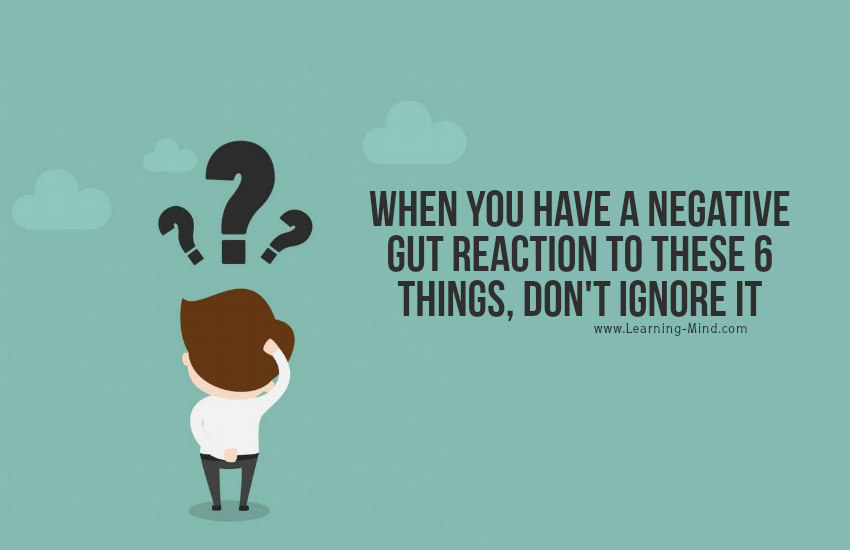When You Have a Negative Gut Reaction to These 6 Things, Don’t Ignore It
There are times when it’s good to make rational decisions.But when you have a gut reaction to certain people and situations, you shouldn’t ignore it.

. A gut instint can give us more information than we think. We sometimes react to information from the senses before our logical minds even have a chance to process it. Often, we recognize that something is just a little ‘off’ in a situation. We should never ignore these gut reactions, even if we are not sure why we have them. David Myers, Ph.D., a social psychologist, explains that the ‘intuitive right brain is almost always “reading” your surroundings, even when your conscious left brain is otherwise engaged’. Our brains are constantly taking in new information from the environment around us. We can’t always analyze this information quickly enough to react with our rational minds. However, a part of us knows when something is wrong and our body sends us signs. This might be a headache, a stomachache, or the hairs on the back of our neck standing up. Or it might just be a feeling that something is not quite right. We should never ignore these gut reactions. Our intuition sometimes knows more than we think. If you have an instinct that something is wrong in your body, don’t ignore it. Our gut instincts are often responses to subtle signs that the conscious mind doesn’t even notice. But it is worth paying attention to them. It is always best to get professional advice if you feel something is wrong in your body. In addition, pay attention to any gut reactions you have in certain situations or in response to certain foods or activities. Trust that your gut knows what is good for you and what is not. If you ever experience a negative gut reaction to someone, pay attention. When you feel those signs, your intuitive brain may have noticed something that your rational mind missed. You might have a negative reaction to a potential partner, boss, colleague or just a stranger on the street. It could be nothing, but it’s better to be safe than sorry. Move to a safe environment if you feel like you are in imminent danger. If the clues are more subtle and based on longer-term relationships, take some time to analyze them and see what they mean for the relationship. If you continue to feel bad around that person, it might be time to change the relationship, create some boundaries or end it if appropriate. When choosing what to spend the best part of our lives engaged in, it’s important to listen to our gut. Our rational mind may think about aspects such as financial rewards, social approval and making our parents happy. However, ultimately, you are the one who will have to go to that job every day. If your gut screams no at the very idea – it might be wise to listen. It could save you a lot of time and grief in the long run. We sometimes get strong gut instincts about places as well as people. If you are thinking of moving house, pay attention to any instinctive reactions you have to a potential new abode. If the house feels wrong, or you feel uneasy in the neighborhood, then do a little more digging before you make a commitment to moving there. Our gut instincts often warn us of potential danger. However, this is not the only way they guide us. Sometimes our gut instincts point out when someone needs our help. We often pick up on emotional cues such as body language, facial expressions and tone of voice that let us know when someone is in need even if they haven’t asked for help. If you have an instinct that someone needs your help, you are probably right. Our subconscious mind is also always on the alert for danger so it makes sense to pay attention to these instincts. For example, we might sense that we need to slow down while driving even though we can’t see any immediate threat. Or we might have a sense that we shouldn’t walk home our usual way.
These instincts can sometimes be life-saving. Of course, sometimes these signs are off. We can, on occasion, be over cautious. However, if you are in a situation that seems dangerous, it makes sense to listen to those signs and take appropriate action. While we shouldn’t rely on our gut reactions as our only way of making decisions, there is something to be said for paying attention to these feelings. We have to find a balance between listening to our instincts and making rational decisions. Neither one is better than the other. But we have access to both types of knowing, and used together, they can help us to be happy and safe and make better decisions.
Read the full article at the original website
References:
- https://hope.edu/directory/people/myers-david/index.html
- https://www.learning-mind.com/intuitive-thinking/
- https://www.learning-mind.com/social-cues/
- https://www.learning-mind.com/facial-expressions-lies/
- https://www.learning-mind.com/power-of-subconscious-mind/
- https://www.learning-mind.com/basic-instincts-dominant/
- https://www.learning-mind.com/fail-to-be-happy-intelligent/
- https://www.learning-mind.com/author/kirstie/
- https://www.learning-mind.com/negative-gut-reaction/
- https://www.learning-mind.com/existential-intelligence-signs-above-average/
- https://www.learning-mind.com/profound-little-prince-quotes-deep-thinker/
- https://www.learning-mind.com/contact/
- https://www.amazon.com/dp/B08LTNJVTZ
